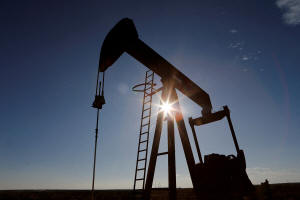|
Brent crude futures dipped 8 cents to $81.53 a barrel by 0914
GMT while U.S. crude lost 20 cents to $77.17. Both had dropped
on Tuesday to their lowest since July 24.
"The market is clearly less concerned about the potential for
Middle Eastern supply disruptions and is instead focused on an
easing in the balance," ING analysts Warren Patterson and Ewa
Manthey said in a note to clients, referring to tight crude
supply conditions.
Crude oil production in the United States this year will rise by
slightly less than previously expected but demand will fall, the
U.S. Energy Information Administration (EIA) said on Tuesday.
The EIA now expects total U.S. petroleum consumption to fall by
300,000 barrels per day (bpd) this year, reversing its previous
forecast of a 100,000 bpd increase.
U.S. crude oil stocks rose by almost 12 million barrels last
week, market sources said late on Tuesday, citing American
Petroleum Institute figures. [API/S]
The EIA will delay the release of weekly inventory data until
the week of Nov. 13.
Adding to fears of weakening global demand, data from China, the
world's biggest crude oil importer, showed its total exports of
goods and services contracted more quickly than expected.
That reflects "a struggling domestic and global economy, which
adversely affects the oil balance", said Tamas Varga of oil
broker PVM.
However, China's October crude oil imports showed robust growth
and its central bank governor said on Wednesday that the world's
second-biggest economy is expected to hit its gross domestic
product growth target this year. Beijing has set a target of
about 5% growth this year.
Tempering supply concerns, analysts from Goldman Sachs estimated
seaborne net oil exports by six countries from oil producer
group OPEC will remain only 0.6 million bpd below April levels.
OPEC has announced cumulative production cuts amounting to 2
million bpd since April 2023.
In more bullish news for crude prices, OPEC expects the global
economy to grow and drive fuel demand despite economic
challenges including high inflation and interest rates.
(Reporting by Paul Carsten, Stephanie Kelly and Muyu XuEditing
by David Goodman)
[© 2023 Thomson Reuters. All rights
reserved.]
This material may not be published,
broadcast, rewritten or redistributed.
Thompson Reuters is solely responsible for this content.

|
|




